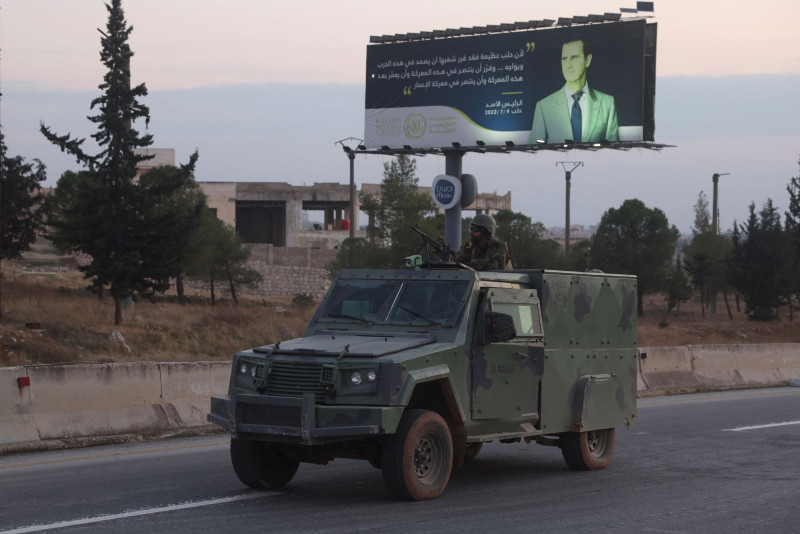The raid ended years of comparative calm in northwest Syria – Damascus troops retreated without firing a shot, “without a fight”.
Two days after launching a surprise, lightning attack on government troops, jihadists and their allies have taken roughly half of Aleppo, Syria’s second largest urban center, reaching the city’s historic fortress, a non-governmental organization told AFP today.
“Half of the city of Aleppo is now under the control of (jihadist group) Hayat Tahrir al-Sham and organizations allied with it,” Rami Abdel Rahman, the director of the Syrian Observatory for Human Rights told AFP, explaining that in the second phase of the hostilities, the troops of Damascus withdrew without firing a rifle, “without a fight”.
The jihadists entered Aleppo, as part of an offensive that has now lasted four days and ended years of relative calm in northwestern Syria. Yesterday, the jihadist organization Hayat Tahrir al-Sham (HTS – HTS) – dominated by al-Qaeda’s former Syrian arm – and allied groups, some from Turkey, arrived at the city gates after two suicide car bomb attacks. They then occupied several districts, according to the NGO.
Eyewitnesses said yesterday that they saw gunmen in Aleppo and saw scenes of panic in the urban center. An AFP correspondent spoke of fighting between jihadists and their allies on the one hand, and the army and its auxiliaries, members of organizations supported by Iran, on the other.
“For the first time in almost five years, we are constantly hearing rockets and artillery shells and sometimes aircraft,” said Sharmad, a resident of the area. “We are afraid that the war scenario will repeat itself and we will be forced to leave our homes.”
At least 277 people have been killed in the fighting, according to an estimate given earlier by the non-governmental organization.
These are the bloodiest clashes since 2020 in the Syrian sector where Aleppo province, largely controlled by President Bashar al-Assad’s regime, borders Idlib, the last major jihadist and rebel stronghold.
Also yesterday, jihadists and rebels took control of the strategically important city of Saraqeb, south of Aleppo, where two highways connecting Damascus with Aleppo and with Latakia respectively intersect, according to information from the Syrian Observatory for Human Rights.
Syrian forces and allies are reorganizing around the city – Trying to blockade Aleppo
Early this morning, the Reuters news agency reported that the Syrian armed forces had closed key roads to and from Aleppo as its units were ordered to proceed with a “safe withdrawal” from districts quickly overrun by jihadists and rebels, citing three sources in the army.
Earlier, Reuters reported that the airport was closed and all flights were canceled.
The move appears designed to seal off the city as soldiers manning checkpoints around Aleppo have been ordered to allow only members of the armed forces through.
The Russian military has announced that its air force has struck “extremist” positions in Syria in support of government forces, according to Russian news agencies. The Syrian air force also carried out raids in Idlib province, according to the Syrian Observatory for Human Rights.
Moscow has promised Damascus additional military aid to repel the attack, according to Reuters sources in the Syrian armed forces. Additional Russian military hardware is expected at Khmeimim airbase, near the coastal city of Lattakia, within the next 72 hours, they said.
The role of Hezbollah and Iran
In the course of Syria’s civil war, which broke out in 2011, has claimed the lives of over half a million people and turned millions more into internally displaced persons and refugees, the HTS captured most of Idlib province, as well as parts of neighboring provinces of Aleppo, Hama and Lattakia.
His powers Syrian regime, with the help of their allies, Russia, Iran and organizations related to it, such as Hezbollah of Lebanon, regained control of the country and in 2016 were able to drive the rebels out of Aleppo after devastating bombardments.
Northern Syria has seen an uneasy calm in recent years, following a ceasefire brokered by Russia and Turkey — which is the main patron of some rebel groups on its border with Syria.
Stressing that he could not fully explain the speed of the jihadists’ advance, Rami Abdel Rahman questioned whether Damascus’s troops were “dependent on Hezbollah”, most of whose forces are now in Lebanon.
Tehran, a key ally of Damascus, has once again expressed its “support” in Syria, where it has been involved militarily to support Assad’s forces.
For its part, the Kremlin called on the Syrian authorities to “restore order as soon as possible” in Aleppo province.
During a press conference, the head of the self-proclaimed “government” in Idlib, Mohammed al-Bashir, justified the raid last Thursday, saying that “the criminal regime had gathered forces on the front lines and started shelling areas where civilians were, which caused the exodus of tens of thousands of citizens”.
The United Nations Office for the Coordination of Humanitarian Affairs (OCHA) reported earlier this week that “more than 14,000 people — almost half of them children — have been displaced” by the hostilities.
Reuters sources in the Syrian opposition, who maintain contact with Turkish intelligence, said Ankara had given the go-ahead for the raid. However, a representative of Turkey’s Ministry of Foreign Affairs assured that the aim of the government of Recep Tayyip Erdogan is to avoid further instability in the region.
Source :Skai
With a wealth of experience honed over 4+ years in journalism, I bring a seasoned voice to the world of news. Currently, I work as a freelance writer and editor, always seeking new opportunities to tell compelling stories in the field of world news.











